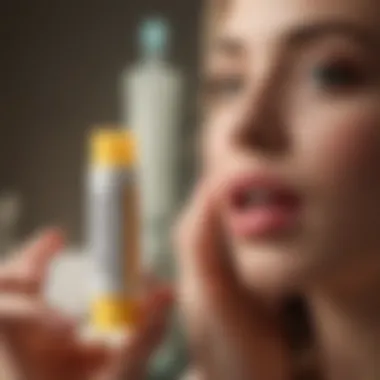Effective Remedies for Chapped Lips: A Comprehensive Guide


Intro
Chapped lips are a mundane yet bothersome issue. Many people do not realize how common this condition is. Factors such as dry weather, dehydration, and certain habits significantly affect lip health. Understanding the reasons behind chapped lips is the first step toward preventing and treating this condition.
Key Points to Discuss
This guide navigates through various effective remedies, offering insights on natural treatments, over-the-counter options, and everyday practices. Each section will provide actionable knowledge to help maintain lip health. A comprehensive look into various aspects related to chapped lips ensures that readers are armed with information that is effective and practical.
"Chapped lips can be a signal from your body, indicating a need for better hydration and care."
Relevance of the Topic
Discussing chapped lips transcends beyond mere aesthetics. Healthy lips contribute to overall well-being. For many, maintaining this simple aspect of appearance is tied to confidence and social interactions. Failure to address chapped lips can lead to discomfort and sometimes more serious skin issues. Thus, it is essential to educate oneself and take preventive measures actively.
Understanding Chapped Lips
Understanding chapped lips is essential for anyone seeking to maintain healthy skin. It sheds light on various aspects that can influence lip health, including environmental factors, lifestyle habits, and underlying medical conditions. A comprehensive grasp of this topic not only assists in recognizing symptoms but also in adopting effective managing strategies. Individuals need to be aware of the implications of chapped lips, which can range from minor discomfort to more serious complications if left untreated. Building awareness can empower individuals to take proactive steps toward prevention and care.
Definition and Symptoms
Chapped lips, also known as cheilitis, refer to lips that are dry, cracked, or scaled. Often, they feel uncomfortable and may lead to inflammation. Symptoms can vary from person to person but typically include:
- Peeling or flaking skin on the lips
- A tight feeling when smiling or speaking
- Discomfort or a burning sensation
- Redness around the lip area
Recognizing these symptoms early can prompt timely intervention, ideally before the condition worsens.
Common Causes of Chapped Lips
Several factors can contribute to chapped lips, making awareness crucial for prevention. Some common causes include:
- Environmental Factors: Dry weather, exposure to wind, and sudden temperature changes can strip the lips of moisture.
- Hydration Deficiency: Inadequate water intake can result in dehydration, affecting the lips significantly.
- Dietary Factors: Nutritional deficiencies, particularly lack of vitamins B, C, and E, can negatively impact lip health.
- Irritants: Certain products, like lipsticks or toothpaste containing harsh ingredients, can lead to irritation.
- Habits: Licking the lips often worsens dryness as saliva evaporates quickly, leaving lips drier than before.
Understanding these causes can guide individuals in making necessary lifestyle adjustments to healthily maintain their lips.
Differentiating Chapped Lips from Other Conditions
Chapped lips, while common, can sometimes mimic or overlap with other conditions. Differentiating them is vital to effective treatment. Here are some conditions that could be confused with chapped lips:
- Cold Sores: Caused by the herpes simplex virus, these sores appear as blisters and may be painful.
- Angular Cheilitis: This involves cracks at the corners of the mouth and may be due to fungal infections or vitamin deficiencies.
- Eczema: This skin condition may affect the lip area with irritation and inflammation.
Identifying these distinctions is crucial as it determines the appropriate course of treatment. In cases where chapped lips persist despite self-care measures, seeking medical advice is recommended.
Natural Remedies for Chapped Lips
Natural remedies play a significant role in addressing the issue of chapped lips. These solutions are often preferred not only for their effectiveness but also for their gentleness on the skin. Many natural remedies contain compounds that are similar to the lipids found in our skin, making them suitable for restoring moisture and barrier function. Additionally, these options tend to avoid synthetic chemicals, which can sometimes irritate more sensitive skin types.
When considering natural remedies, it's essential to choose products that are rich in nutrients, easy to apply, and preferably free from allergens. They can provide immediate relief and long-term benefits, promoting overall lip health. Moreover, these solutions are generally accessible and cost-effective, making them appealing to a broad audience.
Coconut Oil


Coconut oil has become increasingly popular for lip care due to its rich texture and moisturizing qualities. It is a natural emollient, which means it helps to soften and hydrate the skin. Coconut oil contains fatty acids that penetrate the skin barrier, providing deep hydration. Moreover, it can form a protective layer, helping to prevent moisture loss from the lips.
Applying coconut oil is simple. Users can place a small amount on their fingers and gently massage it into the lips. The oil can be used alone or as a base for other ingredients like essential oils. It's also beneficial for its anti-inflammatory properties, which can soothe irritation caused by chapped lips.
Honey as a Moisturizer
Honey is well-known for its natural humectant properties, meaning it attracts and retains moisture. This quality makes honey an excellent choice for treating chapped lips, as it can help restore hydration effectively. Additionally, honey has antibacterial properties, which can aid in preventing infections in cracked lips.
To use honey, one can apply a thin layer directly onto the lips and leave it on for several minutes before rinsing off. For added hydration, users can mix honey with other natural ingredients, such as coconut oil or aloe vera gel, to create a more potent treatment.
Aloe Vera Gel
Aloe vera is revered for its soothing properties. It has anti-inflammatory and healing benefits, making it ideal for treating chapped lips. The gel contains vitamins and antioxidants that contribute to skin health, promoting the regeneration of skin cells in dry areas. Its hydrating properties make it suitable for restoring moisture in chapped lips.
When using aloe vera, individuals should opt for pure aloe gel from the plant, as this ensures they receive the maximum benefits without additives. Applying aloe vera several times a day can significantly improve the condition of the lips.
Beeswax Applications
Beeswax acts as a natural barrier, locking in moisture and protecting the skin from environmental factors. It is beneficial particularly in cold or dry weather when lips are prone to chapping. Beeswax is non-comedogenic, meaning it does not clog pores, and has natural anti-inflammatory properties.
Users can create a DIY lip balm by melting beeswax and mixing it with oils like coconut or jojoba. This combination can provide both hydration and protection for the lips, ensuring they stay smooth and plump throughout the day.
Exfoliating with Sugar Scrubs
Exfoliation is an essential step in maintaining lip health. Sugar scrubs can remove dead skin cells, which often accumulate and contribute to chapped lips. The gentle exfoliation helps to reveal smoother skin underneath and promotes better absorption of moisturizers.
To make a sugar scrub, mix sugar with a natural oil like olive or coconut, and gently massage it onto the lips in a circular motion. Rinse it off with warm water. Using a sugar scrub 1-2 times a week can lead to healthier, more supple lips. Remember to follow up with a moisturizing treatment for best results.
"Natural remedies for chapped lips not only provide immediate relief but also promote long-term hydration and health."
Adopting these natural remedies for chapped lips can lead to improved hydration and overall lip health. Each option has unique benefits, making them valuable for anyone looking to enhance their lip care routine.
Over-the-Counter Solutions
Over-the-counter solutions play a significant role in addressing chapped lips, offering various options that can help soothe and protect the delicate lip area. These products can be essential in managing symptoms and providing immediate relief, especially when environmental factors contribute to dry, cracked lips. While natural remedies are valuable, over-the-counter items often come with specific formulations designed to combat the underlying causes of chapped lips. In this section, we will examine lip balms and ointments, medicated lip products, and the use of humidifiers as practical solutions for lip care.
Lip Balms and Ointments
Lip balms and ointments are among the most popular over-the-counter solutions for chapped lips. They often contain moisturizing ingredients like petroleum jelly, shea butter, or natural oils, which help to lock in moisture and create a protective barrier against environmental elements.
- Benefits: Lip balms nourish the lips, prevent moisture loss, and can soothe discomfort from dryness. They are especially useful during colder months or in dry climates where lips are prone to cracking.
- Considerations: When selecting a lip balm, it is important to check the ingredient list. Some products contain fragrances or artificial additives which may irritate sensitive lips. Opt for products labeled as hypoallergenic or designed for sensitive skin to minimize reactions.
"Choosing a quality lip balm can make a significant difference in lip health. Look for formulations without irritants for the best results."
Medicated Lip Products
Medicated lip products come into play when chapped lips are more persistent or severe. These products are formulated to treat underlying conditions, such as cheilitis or other dermatological issues related to the lips.
- Active Ingredients: Common active ingredients in these products may include hydrocortisone, lidocaine, or benzocaine. These components work to reduce inflammation, alleviate pain, and promote healing.
- Usage Guidelines: It is vital to follow instructions carefully when using medicated lip products. Overuse can lead to further irritation or dependency on these treatments. If lips do not improve after consistent application, seeking professional advice may be necessary.


Humidifiers for Lip Care
Using humidifiers can be an often-overlooked yet effective method for combating chapped lips. In dry environments, either from outdoor conditions or indoor heating, the air loses moisture, which can quickly affect lip hydration.
- Functionality: A humidifier adds moisture back into the air, helping to maintain skin and lip hydration.
- Recommended Settings: Operating a humidifier, especially during sleep, can provide compounded benefits. It’s advisable to keep the device in a bedroom during nighttime and maintain optimal humidity levels.
Including humidifiers in your daily environment can significantly ameliorate conditions leading to chapped lips, enhancing overall lip health alongside topical treatments.
By utilizing over-the-counter solutions effectively, individuals can address chapped lips comprehensively. Products such as lip balms and medicated items combined with environmental enhancements like humidifiers promote healing and protection for lips.
Lifestyle Adjustments
Lifestyle adjustments play a crucial role in managing and preventing chapped lips. Making conscious decisions about one's environment and habits can lead to significant improvements in lip health. These adjustments can contribute not only to the comfort of the lips but also to their overall well-being.
Hydration and Diet
Maintaining proper hydration is essential for overall health, including the condition of the lips. Dehydration can manifest in dry skin, and chapped lips are no exception. It is important to drink adequate water throughout the day to keep the body and skin hydrated. This means aiming for at least eight glasses of water daily, or more, depending on individual needs and activity levels.
Diet also greatly impacts lip health. Including foods rich in vitamins and minerals, such as fruits, vegetables, and whole grains, supports skin health. Foods high in omega-3 fatty acids, like salmon and walnuts, can also help in maintaining lip moisture. Additionally, avoiding excessive amounts of caffeine and alcohol, which can contribute to dehydration, is advisable.
Sun Protection for Lips
The lips are delicate and often overlooked when it comes to sun protection. UV radiation can lead to sunburn and long-term damage, including an increased risk for skin cancer. Using a lip balm that contains SPF is an effective way to shield lips from harmful rays. It is essential to apply this product before sun exposure and to reapply it every couple of hours, especially during outdoor activities. This simple adjustment can help prevent drying and damage caused by sun exposure.
Avoiding Irritating Ingredients
Many commercial products contain ingredients that can irritate the lips, exacerbating dryness and chapping. It is vital to read labels and avoid products with artificial flavors, fragrances, or alcohol. Instead, look for lip care items that are formulated with natural ingredients that nourish and hydrate. Opting for products listed as hypoallergenic can also help reduce the risk of irritation.
Quit Smoking and Limit Alcohol Intake
Both smoking and excessive alcohol consumption can have detrimental effects on lip health. Smoking can lead to dry, chapped lips due to the chemicals in tobacco. Additionally, it restricts blood flow to the lips, further contributing to dryness. Reducing or quitting smoking has immediate benefits for lip health and overall appearance.
Similarly, alcohol acts as a diuretic, leading to dehydration. Limiting alcohol intake can help maintain moisture levels in the body, positively influencing lip condition.
In summary, implementing these lifestyle adjustments is instrumental in maintaining healthy lips. From hydration and diet choices to sun protection and avoiding irritants, each element contributes to a holistic approach to lip care.
Seeking Professional Help
When dealing with chapped lips, it can be tempting to rely solely on home remedies or over-the-counter products. However, there are situations where seeking professional help is essential. Consulting with a healthcare expert, specifically a dermatologist, offers not only guidance but also tailored solutions to your individual needs. Understanding when and why to reach out for professional assistance can significantly improve the management and treatment of chapped lips.
When to See a Dermatologist
Recognizing when chapped lips require professional attention is crucial. If you notice persistent dryness, cracking, or discomfort that does not improve with standard home treatments, it may be time to visit a dermatologist. Here are some key indicators:
- Chronic Symptoms: If your lips remain chapped despite consistent moisturizing efforts, a dermatologist can provide deeper insight into potential underlying issues.
- Severe Discomfort: Severe pain, swelling, or signs of infection are strong indicators that you should seek professional help. These symptoms could signal a more serious condition that needs specialized treatment.
- Allergic Reactions: If you suspect that an irritant or allergen is responsible for your chapped lips, a dermatologist can help identify the specific substance and recommend appropriate allergy tests or treatments.
The earlier you seek assistance, the sooner you can achieve relief and prevention of further complications.
Potential Prescription Treatments


In some cases, over-the-counter remedies may not be sufficient. For individuals with more severe chapped lips, dermatologists can prescribe specialized treatments. These may include:
- Topical Steroids: If inflammation is significant, mild topical steroids can reduce swelling and improve healing.
- Hydrating Ointments: Prescription ointments that contain advanced moisturizing ingredients might be advised for more effective hydration and barrier restoration.
- Antibiotic Creams: If an infection is present, a doctor may prescribe antibiotic creams to treat the affected area promptly.
- Oral Medications: In rare cases where systemic hydration is necessary, dermatologists may recommend oral medications that can improve overall skin health, including the lips.
Always discuss the potential side effects and benefits of any prescribed treatments with your healthcare provider. This collaborative approach ensures a comprehensive understanding of your condition and a tailored strategy to keep your lips healthy.
Seeking help from a professional can provide relief in ways that self-care efforts may not achieve, especially in persistent cases.
By understanding the importance of seeking professional help, you empower yourself to take control of your lip health. The path to well-being often includes informed decisions about when to engage healthcare specialists.
Preventive Measures
Preventive measures play a crucial role in maintaining lip health. Chapped lips can occur due to various reasons such as weather changes, dehydration, and exposure to irritants. Understanding how to prevent this condition is important for avoiding discomfort and promoting overall lip care.
Establishing a Lip Care Routine
Creating a consistent lip care routine is paramount to keep lips hydrated and healthy. One should start by applying a nourishing lip balm daily. Look for products that contain ingredients like cocoa butter, shea butter, or beeswax. These components provide a barrier against moisture loss.
In addition, one must remember to exfoliate lips gently. A simple mixture of sugar and honey can serve as an effective scrub. This helps remove dead skin cells that may contribute to peeling and discomfort. It is advisable to exfoliate once a week, particularly during colder months when lips tend to dry out.
Choosing the Right Products
Selecting suitable lip care products is essential for effectiveness. Products labeled as "hypoallergenic" or "fragrance-free" can minimize the chance of irritation for individuals with sensitive skin. Look for those with SPF, especially if spending time outdoors, as sun exposure can exacerbate chapped lips.
Moreover, steer clear of lip products containing potential irritants like menthol or camphor. While they can provide a cooling effect, they may lead to further drying of the lips over time. Prioritize natural and moisturizing formulations for optimal results.
Environmental Awareness
One must be aware of environmental factors that can negatively impact lip health. Dry and windy weather conditions significantly contribute to lip chap. During such times, it is prudent to cover the lips with a scarf or other protective gear. Moreover, indoor heating can also deplete moisture in the air, aggravating the issue.
To combat these effects, using a humidifier can help maintain moisture levels in the home. Keeping the air adequately humidified can significantly benefit skin and lip hydration during the winter months.
"Prevention is better than cure." Taking proactive steps in lip care can save unnecessary discomfort and protect your lip health.
By paying attention to preventive measures, individuals can significantly reduce the likelihood of experiencing chapped lips. Implementing a solid lip care routine, choosing the right products, and being mindful of environmental factors creates a more sustainable approach to maintaining beautiful and healthy lips.
Epilogue
In this article, we have explored effective remedies and preventive measures for chapped lips. Understanding the importance of proper lip care is essential for maintaining their health and appearance. Chapped lips can be more than just an aesthetic issue; they can also lead to discomfort and even pain. Therefore, the strategies covered throughout this guide aim to prevent and alleviate chapped lips effectively.
Summary of Key Strategies
Here are the main strategies discussed in this article:
- Natural Remedies: Using coconut oil, honey, aloe vera gel, beeswax, and sugar scrubs can provide hydration and relief from chapped lips. Natural ingredients are often gentle, making them suitable for most skin types.
- Over-the-Counter Solutions: Lip balms and ointments formulated with healing ingredients can offer immediate relief. Medicated options may also help in severe cases, while humidifiers can maintain moisture in the air, providing general comfort.
- Lifestyle Adjustments: Staying hydrated, protecting lips from sun exposure, avoiding irritants, and reducing harmful habits like smoking can significantly contribute to overall lip health.
- Seeking Professional Help: If chapped lips persist despite these efforts, consulting a dermatologist can ensure that there are no underlying health concerns. Prescription treatments might be necessary in some cases.
- Preventive Measures: Establishing a careful daily lip care routine by choosing the right products and being mindful of environmental conditions can help maintain lip health over time.
Encouragement for Ongoing Care
Taking care of your lips is an integral part of personal health. Consistent care can lead to healthier, more supple lips. This involves not just using products as needed but also making informed choices about your diet, hydration, and overall lifestyle.
The information provided in this guide aims to empower you. By following these strategies, you may reduce the incidence of chapped lips. Regular maintenance and prompt responses to initial symptoms can prevent serious discomfort and maintain a pleasing appearance. Remember, healthy lips are achievable with the right knowledge and care.
"The best way to predict your future is to create it." – Peter Drucker
By integrating these practices into your daily routine, you can set a foundation for long-term lip health.



